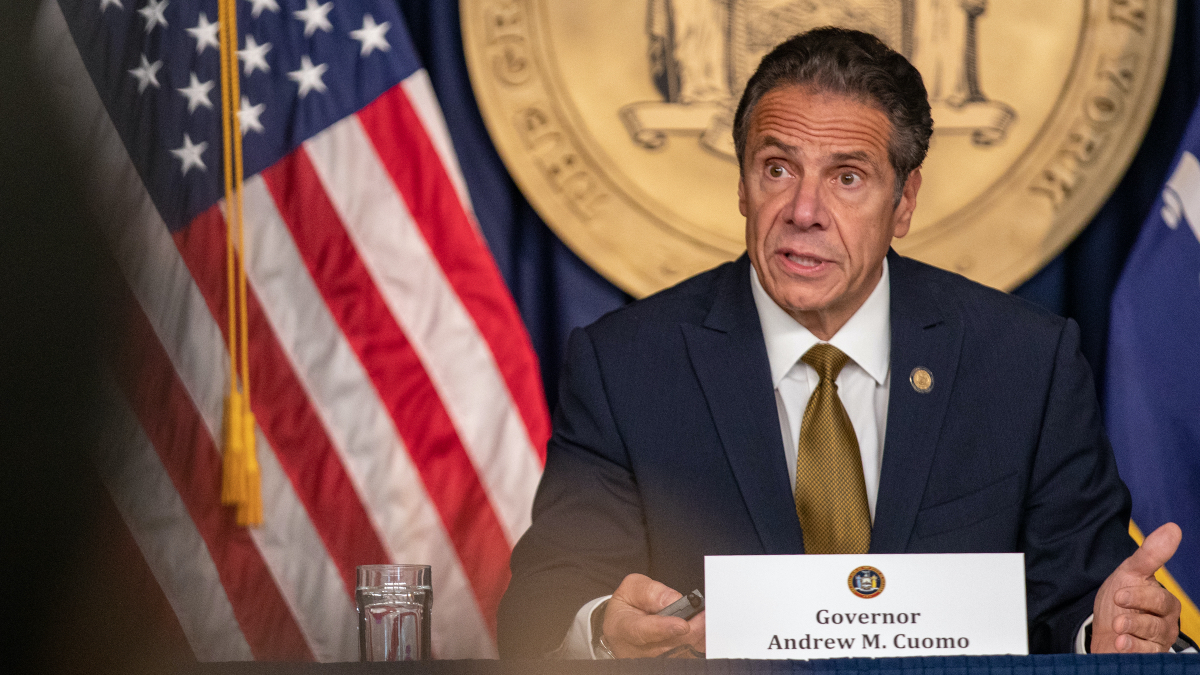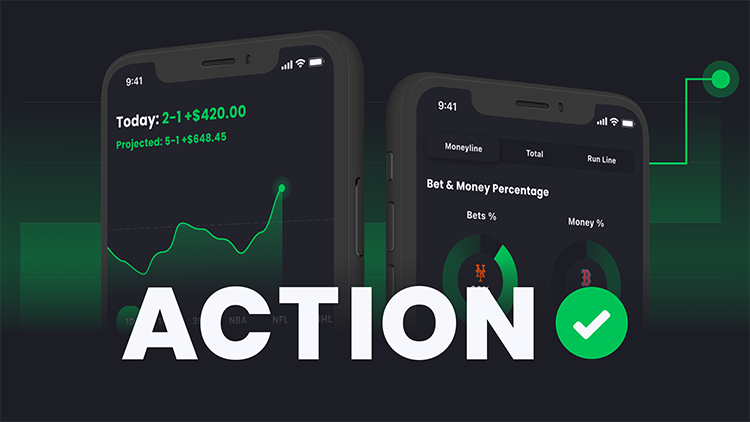Cuomo’s Unreleased New York Online Sports Betting Plan Already Facing Obstacles
Jeenah Moon/Bloomberg via Getty Images. Pictured: New York Gov. Andrew Cuomo.
More than three weeks after New York Gov. Andrew Cuomo shook up the national sports betting landscape by endorsing online wagering, the governor has not released many of his plan’s key details. The obstacles awaiting them are already taking shape.
Speaking at a Gaming Americas quarterly webinar Thursday, industry analysts laid out that the lost revenue potential, noncooperative stakeholders and possible legal hurdles awaiting Cuomo’s proposed lone or limited-operator sports betting model. Cuomo’s fleshed-out plan is expected shortly, but it already has to overcome these hurdles as well as a competing bill advancing through the legislature that is backed by members of his own party.
Cuomo’s original online betting support, announced at a press conference earlier this month following years of opposition, would allow only one operator to be bid between the state’s four commercial casinos. Further press statements and a preliminary budget submission expanded the market from one operator to “one or more” but still upset virtually every gaming entity in the state.
Meanwhile, a long-awaited, government-commissioned gaming study released last week didn’t even consider any of Cuomo’s proposal. Instead, it outlined scenarios for a competitive model that has largely succeeded in neighboring New Jersey and Pennsylvania.
Industry stakeholders now await Cuomo’s next move. With New York facing a projected $15 billion shortfall and an April 1 budget deadline, it increasingly appears that there is little support — and significant opposition — for a limited sports betting market anywhere outside the governor's mansion.
“I think part of the difficulty with Gov. Cuomo's proposal for winner-take-all on mobile betting is that it could leave a lot of disgruntled stakeholders,” said gaming lawyer Daniel Wallach during Thursday’s webinar.
Issues for New York Online Sports Betting
Cuomo’s plan contrasts fellow Democratic lawmakers’ proposals that have already advanced out of committee in both chambers of the legislature.
Spearheaded by Assemblymember J. Gary Pretlow and Sen. Joseph Addabbo, the legislation would allow the state’s four commercial casinos and three Native American gaming tribes to open two online sportsbooks apiece, creating the potential for as many as 14 regulated mobile options. The legislation would also allow off-track betting facilities and professional sports venues to accept in-person bets.
Though it was far from perfect, Wallach said the current legislation would at least give a wide variety of stakeholders a part of the expanded sports betting market, creating a “tapestry” of gaming interests.
“What Gov. Cuomo was proposing would be basically an unraveling of that tapestry,” Wallach said.
The political opposition aside, Wallach has also argued Cuomo’s plan to run online sports betting through the state lottery violates the New York constitution. Citing the state constitution’s gambling prohibitions as well as a 1980’s attorney general opinion issued when Cuomo’s father, Mario Cuomo, was governor, Wallach said a lottery-run plan that excludes most gaming stakeholders could spark lawsuits that derail the whole operation.
“The real risk here is if you create too many losers those disgruntled stakeholders can become potential plaintiffs,” Wallach said. “The unintended consequences of Gov. Cuomo's proposal is that while it might represent the highest potential economic upside, it comes with a corresponding amount of legal risk.”
Industry analysts also worry about the economic pitfalls of a limited market.
Cuomo argued his model would generate $500 million in annual taxes for the state government, but most leading gaming voices have said it’s impossible to capture a large enough portion of the legal market to generate that revenue without multiple, competing options.
By Cuomo’s own projections, 20 percent of sports betting revenues in New Jersey, the largest market by total handle, comes from New Yorkers. New Jersey has more than a dozen sportsbook options already and state law allows for more than 30.
“Many of the (New Yorkers) that have been gambling in New Jersey are with an operator and they have their accounts set up,” said C.J. Fisher, a partner at the Atlantic City office of Fox Rothschild LLP, during Thursday’s webinar. “If you're legalizing in New York, you're going to have to find a way to get those players.”
Another Hurdle in the Governor’s Mansion
On top of all these hurdles, the biggest issue may be Cuomo himself.
An increasingly influential Democratic party leader nationally and locally, Cuomo almost singlehandedly smothered online sports betting hopes in recent years as he questioned the constitutional authority to do so while dismissing its revenue potential as a "rounding error" for the multibillion-dollar annual state budget.
Now facing the largest budget shortfall in state history, Cuomo has turned to online wagering as one small reprieve for the gaping budget hole but is doing so in a way that may not be politically or logistically feasible.
Fisher told webinar attendees Cuomo could be just using his position as a starting point for further negotiations. Though it was hard to parse Cuomo’s true motivations, Fisher warned his support was critical to any sports betting hopes.
Industry observers largely doubt Cuomo’s fellow Democrats in the legislature would use precious political capital to override a potential veto on something as relatively trivial as online sports betting. Others have noted the potential parallels between then-Michigan Gov. Rick Snyder and his 2018 veto of a gaming package championed by fellow Republicans.
“If you don’t have him on board, then whatever the bill is that is being floated around, basically means you’re just spinning your wheels,” Fisher said.
Sports Betting Model Structure Looms Large
Though Cuomo hasn’t announced his plans for key issues such as licensing fees and tax rates, he could be jockeying for a “New Hampshire-style” bidding model, said Wallach, who has testified as a gaming law expert in statehouses across the country. The 2019 New Hampshire sports betting law allowed multiple operators market access, but Boston-based DraftKings offered 51 percent revenue share in exchange for exclusive access to the market, a deal state officials couldn’t pass up.
Wallach said a similar bidding war could be brewing in New York between the four affiliated commercial sportsbook partners (DraftKings, FanDuel, BetRivers and Bet 365) Cuomo mentioned in his original press release. With a far larger population, New York would likely achieve bids greater than or equal to 51 percent of revenues, but it remains to be seen how that could happen without granting one operator a de facto monopoly.
With few sportsbooks allowed to access the market, this automatically slashes the potential for lucrative application, licensing and renewal fees. These fees have generated millions by themselves in larger sports betting markets and are one of the largest potential revenue sources for state government.
The lone or limited operator also eliminates the competitive incentives for operators, Gambling Law Review editor in chief Steve Ruddock said during Thursday's webinar.
“I don't think a lottery-run monopoly is the way to go with anything just because it reduces the amount of penetration you'll get into the market because you just don't have to advertise as much,” Ruddock said. “You have to compete for the player. That’s better for the player. It's better for the market. And overall, it ends up better for the state.”
With the state’s leading Democratic elected officials now largely supportive of legal sports betting, there is a simmering hope what would be the nation’s largest most lucrative market could take its first legal bet as early as this year. That requires heavy lifting from lawmakers, gaming stakeholders and the governor, but many industry observers are still optimistic.
“Cuomo is looking at the revenue that’s going to come in to the state and he doesn’t really care about anything else,” Ruddock said about Cuomo’s sports betting plans. “As long as lawmakers can come up with a proposal that’s a commercial and tribal (casino) combination and where the governor gets the revenue numbers he’s looking for, I think they’ll be okay.”
How would you rate this article?

